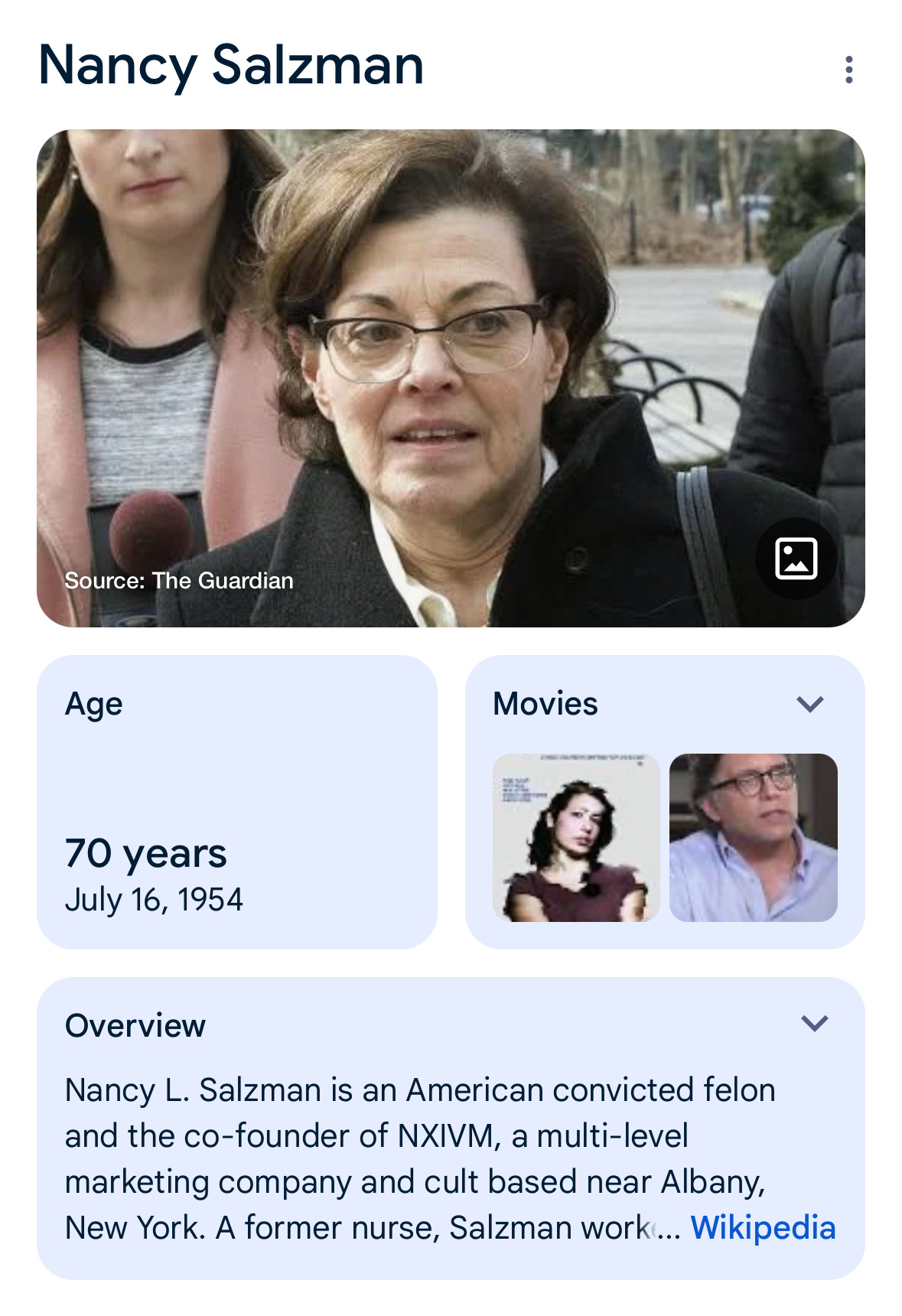On 'Lifting Up' Other Women
Critiquing a Predatory System Is Not the Same Thing as 'Tearing Down' Women
Photo credit: fizkes on Shutterstock
In late 2022, when I started considering speaking out about the ethical issues behind network marketing, someone told me that I should mind my own business, “women should support other women,” they said. Something about that didn’t sit right with me, but I couldn’t quite explain why. Then on March 28th, 2023, I saw a Reel by Mallory DeMilles.
In the caption, Mallory wrote, “To suggest women must blindly support all other women is to suggest that women can not and should not participate in critical thinking or thinking at all. Or to suggest that [the women who are harmed] aren’t worth equal support.”
Ladies and gentlemen, I bring you internalized patriarchy.
Many of us unconsciously adopt and reinforce patriarchal beliefs even against our own interests. It’s a subtle, ingrained acceptance of standards that privileges male dominance, manifesting itself as self-doubt in situations just like this. Internalized patriarchy convinces women that questioning the system is a betrayal, when it is really a self-preservation. We are conditioned to view loyalty as a form of empowerment, reinforcing the idea that success comes from being quiet and compliant.
When I became a first-time mom, I had a secure career in Human Resources management with salary and benefits, but I was terrified of the shift back to work. Everything felt so raw, so demanding, as I learned how to keep an infant alive. A year of maternity leave didn’t feel like enough time, and as the clock ticked on, as I struggled to get my baby on a sleep schedule or even sleeping on his own, my anxiety only increased. This overwhelming anxiety was compounded by pressure to be the perfect mother and give it my 100%. The idea of traditional employment felt incompatible with my new reality. It was in this vulnerable state that I first encountered the false promises of MLMs: flexibility, financial independence, and community.
My personal experience connects to a much broader systemic issue. MLMs prey on the insecurities that patriarchal structures create, while simultaneously discouraging women from scrutinizing them. In an article for The Walrus called How to Break the Bro Code, author Alex Manley shares how internalized patriarchy can look like women gaining influence in certain spaces and adopting exclusionary tactics and reinforcing harmful systems (rather than dismantling them). In commercial cults, this manifests as a reluctance to ruffle feathers by critiquing the business model or leadership, even when exploitation is evident. Much like toxic iterations of cancel culture, MLMs encourage allegiance based on identity rather than merit, making it easier to dismiss dissenting voices rather than engaging with the complexities of their concerns.
Postpartum me, feeling unable to accomplish the roles of mother and worker, roles that felt at odds with one another, I spoke to a mental health counsellor. She advised me to come up with a plan and lay out the numbers to help convince my husband to let me stay home longer. Notice how I said, “let me.”
I decided to become a Health Coach and lead Baby and Me parenting classes for new moms. I took several certification programs, including one by “The Doctor.” A very famous pediatrician who wrote all my favourite parenting books. Once I was certified as a Health Coach through the doctor’s now-defunct certification mill, with several months left on my maternity leave to prove this plan would work, I realized that this coaching gig was not going to be a reliable income source. After spending thousands of dollars on training, a website, business cards, promotional materials, and workbooks for my future workshop attendees, I realized that no one knocks on your door and asks for coaching.
I started attending networking events and made connections with small businesses that would refer clients my way, but it was still not enough to cover our rent. Then, a manila envelope arrived, sent to me personally from the doctor’s daughter, whose name I already knew, because she was the subject of his book about “orchid children.” Elena, the original “orchid child”, now a grown mother herself, had sent me snail mail. I was a bit star-struck. The envelope contained a DVD featuring The Doctor giving a health lecture, which tied in with a line of supplements that I learned many of the coaches who attained their certification from him were distributors for. At the same time, Arbonne was huge in the building where my family and I live. One of my extroverted, bubbly neighbours proudly drove her white Mercedes, and another neighbour had offered to bring me dinner (being a first-time mom to a newborn, of course, I was happy for the reach-out), only to pitch me on her “business opportunity” via a powerpoint on my television while she awkwardly shared her “why” with me over spaghetti on my couch. Providing her daughter with the life she deserves, serving as a role model for independence, and pursuing her dreams. I was intrigued by these women enthusiastically raving about the potential for “financial freedom”, but it also felt off.
I should have listened to my intuition. When I spoke with the Doctor’s daughter on the phone the following week, I asked her if it was a “pyramid scheme”. She laughed kindly and gave me a canned response that I would later learn was a script for answering this question:
“We borrow from the best of several business models. Network marketing, corporate America, and the franchise model. We do this business with direct sales, but like corporate America, we have a benefits package when you reach a certain position in the company. It is like a franchise in that you get all of the marketing and support from our head office to deal with billing and all that. But you don’t have the headache of a brick-and-mortar business. It is only $52 to get your starter package, and there are no minimums in this business.”
I had trust in this family. By the time this conversation had taken place, I had read several 300+ page books written by them, I was a frequent visitor on their parenting website, and I had taken hundreds of hours in training created by them to become certified as a coach. All of this credibility and trust I can see now was leveraged to propel their own side business forward. I was in desperate need to find a way to stay home with my son and be the kind of mother they preached in their books to be optimal. The mother that I believed my son needed.
It was the perfect storm, really. I can only see in hindsight how internalized patriarchy left me doubting my ability to manage work and motherhood, and how it also prevented me from critically assessing the claims this family made while recruiting me.
The Predatory Nature of Network Marketing
My story is far from unique. In her book, Hey, Hun: Sales, Sisterhood, Supremacy, and the Other Lies Behind Multilevel Marketing, Emily Lynn Paulson describes her transition into motherhood to be one that was fraught with feelings of lonliness, isolation and the grief that comes with a loss of self as you try to get your footing. When she was up in the night scrolling her phone and received an invitation for adult conversation and a glass of wine, she couldn’t resist. When she took the next step and attended the event and was soaked in a high-pressure sales environment cosplaying as “women lifting up other women,” she was all in. The women she met promised to be the answers to all her new challenges—identity, financial security, a purpose beyond the home, and a sisterhood.
But instead of empowerment, both Emily and I, as well as countless others, found ourselves inadvertently, wholly devoted to lining the pockets of millionaires. And when we left, we left with nothing to show for it except a gap in our resumes, a justice-sensitive, screaming conscience and a mile-long list of amends to make.
Why Women Are Targeted
There are many facets to the commercial cult playbook that I have addressed in previous posts, but I haven’t spent a lot of time discussing the empowerment rhetoric that MLMs use specifically to attract women. In Little Bosses Everywhere, Bridget Read examines how network marketing companies identified and leveraged the buying power of women as a key focus in their strategy. Bridget traces this back to the post-war era, when Mary Kay, Avon, and the like, saw an opportunity in promoting themselves to homemakers, realizing they controlled household spending but had limited access (at the time) to traditional employment. These companies framed their business model as a vehicle to independence, suggesting women could earn income while leveraging their social networks. However, these “opportunities” were less about actual independence and more about corporate exploitation, using gendered marketing to create a cycle where women were both the primary consumers and the unpaid sales force.
Critique vs. Attacking Women
Inevitably, when people create content to expose harmful practices in network marketing, some will cry, "Shouldn’t we be lifting up women?" This familiar defence suggests that, with so much negativity in the world, women should avoid "tearing down other women." But whenever I hear this, I think of Ghislaine Maxwell. While the scale and intent of harm differ, the underlying mechanism of power exploitation is eerily similar. Both Maxwell and MLM leaders leverage persuasion and trust to recruit other women into exploitative systems. Both dangle the promise of financial success and an aspirational lifestyle as bait. Both foster dependence within their ranks, making it difficult for women to leave without facing layered consequences.
A less extreme but telling example is Nancy Salzman and Alison Mack, two women whom NXIVM cult leader Keith Raniere mobilized to perpetrate abuse within a rigged system designed to extract from women. The point here is not to conflate Weinstein’s victims with MLM workers, but rather to highlight a recurring pattern: high-control, exploitative organizations led by men almost always rely on women to gain the trust of their victims. And if we refuse to hold these women accountable, shielding them under the guise of female solidarity, we risk infantilizing them, denying their agency, and ultimately enabling harm.
Despite never breaking even, I was able to persist far longer than most in MLM—because I fit the mould of what they wanted to see succeed. I was a white woman with a financially stable husband embedded in a large parenting network. These advantages gave me access to resources and support that some in my team didn’t have. Even with those privileges, though, the system still failed me, just as it fails almost every woman who is sold the same dream with far fewer safety nets. At the time, I was pious (as I was trained to be), but in hindsight, I see that my relative “success” was never about my effort. The privileges that allowed me to persist for so long—my background, my network, my health, my financial stability—weren’t markers of true success. They were the optics needed to keep up the illusion that their system works. I refuse to let that illusion stand unchallenged.
“Women do shitty things and other women should be able to talk about it.”
@this.is.mallory
The platitude of “lifting up women,” as a shield to deflect well-deserved criticism, as though women should be beyond any accountability, is baseless. Anti-cult advocates recognize that in most cases, the victims become the perpetrators; therefore, when bad behaviour is highlighted, it is done for educational purposes to expose the harm that is done to women at all levels of the MLM hierarchy.
Calling out commercial cults is not about blaming the women who join, though we should still be held accountable for our actions. Calling out commercial cults is about exposing the systems designed to entrap and exploit them. These structures don't just drain our money; they siphon our time, our emotional labour, and our mental bandwidth, all for the 0.5% at the top.
I shared my first piece of whistleblower content on Instagram a couple of months after reading Mallory’s post in the Spring of 2023. It was at this point that I had the hard-earned knowledge that while challenging cultural norms of being a “good girl,” critiquing MLMs is about exposing the patriarchal and capitalist structures that allow this harm to continue to persist in front of unflinching, blank stares. Lack of informed consent and exploitation disguised as opportunity are the symptoms of everything that is broken in our world.
And as a woman, right now is really the time to embody a refusal to “play small.” And that’s why, here I am, refusing to stay quietly compliant when I know what is happening and have the inherent power to help pull back the curtain.
The intention behind this article is to share my personal experience for informational purposes, from my perspective, and not to malign any specific individual or business entity. Some details were changed, including names, to protect the anonymity of those involved.
Resources:
Paulson, E. L. (2023). Hey Hun: Sales, Sisterhood, Supremecy, and the Other Lies Behind Multi-level Marketing. Row House Publishing.
Manley, A. (2023, July 5). How to Break the Bro Code. The Walrus.
Read, B. (2025). Little Bosses Everywhere: How the Pyramid Scheme Shaped America. Crown.
Demilles, M. (2023, March 28). Instagram post







